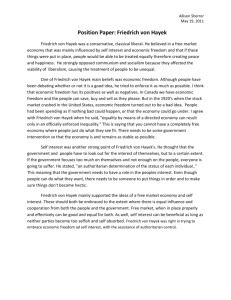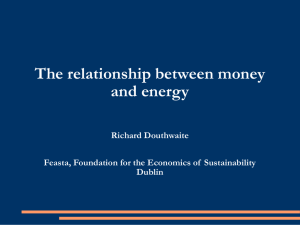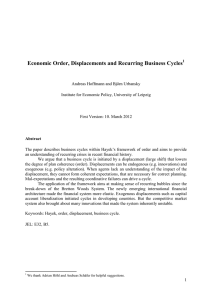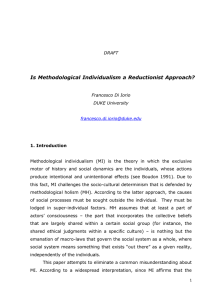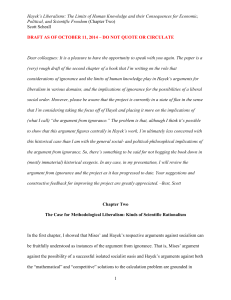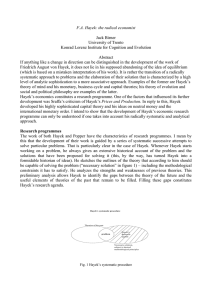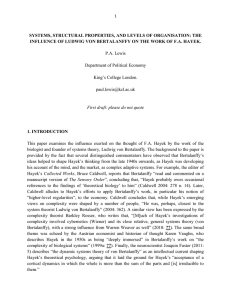Friedrich August von Hayek: THE FICTION OF SOCIAL JUSTICE
advertisement
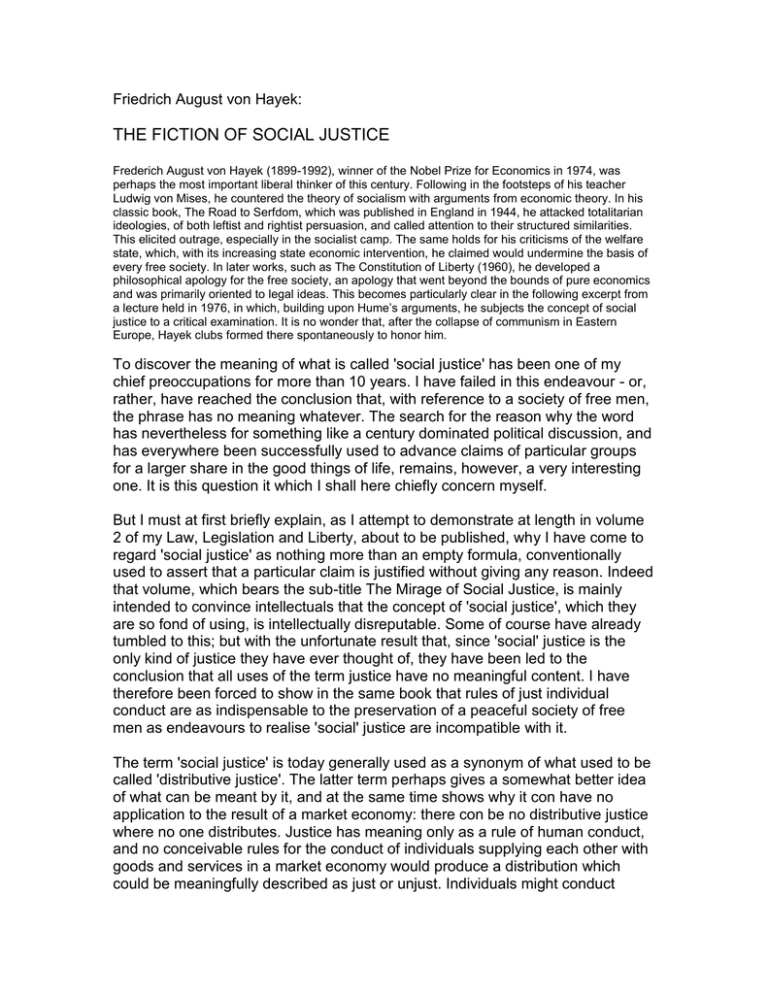
Friedrich August von Hayek: THE FICTION OF SOCIAL JUSTICE Frederich August von Hayek (1899-1992), winner of the Nobel Prize for Economics in 1974, was perhaps the most important liberal thinker of this century. Following in the footsteps of his teacher Ludwig von Mises, he countered the theory of socialism with arguments from economic theory. In his classic book, The Road to Serfdom, which was published in England in 1944, he attacked totalitarian ideologies, of both leftist and rightist persuasion, and called attention to their structured similarities. This elicited outrage, especially in the socialist camp. The same holds for his criticisms of the welfare state, which, with its increasing state economic intervention, he claimed would undermine the basis of every free society. In later works, such as The Constitution of Liberty (1960), he developed a philosophical apology for the free society, an apology that went beyond the bounds of pure economics and was primarily oriented to legal ideas. This becomes particularly clear in the following excerpt from a lecture held in 1976, in which, building upon Hume’s arguments, he subjects the concept of social justice to a critical examination. It is no wonder that, after the collapse of communism in Eastern Europe, Hayek clubs formed there spontaneously to honor him. To discover the meaning of what is called 'social justice' has been one of my chief preoccupations for more than 10 years. I have failed in this endeavour - or, rather, have reached the conclusion that, with reference to a society of free men, the phrase has no meaning whatever. The search for the reason why the word has nevertheless for something like a century dominated political discussion, and has everywhere been successfully used to advance claims of particular groups for a larger share in the good things of life, remains, however, a very interesting one. It is this question it which I shall here chiefly concern myself. But I must at first briefly explain, as I attempt to demonstrate at length in volume 2 of my Law, Legislation and Liberty, about to be published, why I have come to regard 'social justice' as nothing more than an empty formula, conventionally used to assert that a particular claim is justified without giving any reason. Indeed that volume, which bears the sub-title The Mirage of Social Justice, is mainly intended to convince intellectuals that the concept of 'social justice', which they are so fond of using, is intellectually disreputable. Some of course have already tumbled to this; but with the unfortunate result that, since 'social' justice is the only kind of justice they have ever thought of, they have been led to the conclusion that all uses of the term justice have no meaningful content. I have therefore been forced to show in the same book that rules of just individual conduct are as indispensable to the preservation of a peaceful society of free men as endeavours to realise 'social' justice are incompatible with it. The term 'social justice' is today generally used as a synonym of what used to be called 'distributive justice'. The latter term perhaps gives a somewhat better idea of what can be meant by it, and at the same time shows why it con have no application to the result of a market economy: there con be no distributive justice where no one distributes. Justice has meaning only as a rule of human conduct, and no conceivable rules for the conduct of individuals supplying each other with goods and services in a market economy would produce a distribution which could be meaningfully described as just or unjust. Individuals might conduct themselves as justly as possible, but as the result for separate individuals would be neither intended nor foreseeable by others, the resulting state of affairs could neither be coiled just nor unjust. The complete emptiness of the phrase 'social justice' shows men in the fact that no agreement exists about what social justice requires in particular instances; also that here is no known test by which to decide who is right if people differ, and that no preconceived scheme of distribution could be effectively devised in a society whose individuals are free, in the sense of being allowed to use their own knowledge for their own purposes. Indeed, individual moral responsibility for one's actions is incompatible with the realisation of any such desired overall pattern of distribution. A little inquiry shows that, though a great many people are dissatisfied with the existing pattern of distribution, none of them has really any clear idea of what pattern he would regard as just. All that we find are intuitive assessments of individual cases as unjust. No one has yet found even a single general rule from which we could derive that is 'socially just' in all particular instances that would fall under it - except the rule of 'equal pay for equal work'. Free competition, precluding all that regard for merit or need and the like, on which demands for social justice are based, tends to enforce he equal pay rule. The reason why most people continue firmly to believe in 'social justice', even after they discover that they do not really know what the phrase means, is that they think if almost everyone else believes in it, there must be something in the phrase. The ground for this almost universal acceptance of a belief, the significance of which people do not understand, is that we have all inherited from an earlier different type of society, in which man existed very much longer than in the present one, some now deeply ingrained instincts which are inapplicable to our present civilisation. In fact, man emerged from primitive society when in certain conditions increasing numbers succeeded by disregarding those very principles which had held the old groups together. We must not forget that before the last 10,000 years, during which man has developed agriculture, towns and ultimately the 'Great Society', he existed for at least a hundred times as long in small food-sharing hunting bands of 50 or so, with a strict order of dominance within the defended common territory of the band. The needs of this ancient primitive kind of society determined much of the moral feelings which still govern us, and which we approve in others, it was a grouping in which, at least for all males, the common pursuit of a perceived physical common object under the direction of the alpha male was as much a condition of its continued existence as the assignment of different shares in the prey to the different members according to their importance for the survival of the band. It is more than probable that many of the moral feelings then acquired have not merely been culturally transmitted by teaching or imitation, but have become innate or genetically determined. But not all that is natural to us in this sense is therefore necessarily in different circumstances good or beneficial for the propagation of the species. In its primitive form the little band indeed did possess what is still attractive to so many people: a unitary purpose, or a common hierarchy of ends, and deliberate sharing of means according to a common view of individual merits. It has been suggested more than once that the theory explaining the working of the market be called catallactics from the classical Greek word for bartering or exchanging - katalattein. I have fallen somewhat in love with this word since discovering that in ancient Greek, in addition to 'exchanging', it also meant 'to admit into the community' and 'to change from enemy into friend'. I have therefore proposed that we call the game of the market, by which we can induce the stranger to welcome and serve us, the 'game of catollaxy'. The market process indeed corresponds fully to the definition of a game which we find in The Oxford English Dictionary. It is 'a contest played according to rules and decided by superior skill, strength or good fortune'. It is in this respect both a game of skill as well as a game of chance. Above all, it is a game which serves to elicit from each player the highest worthwhile contribution to the common pool from which each will win an uncertain share. The game was probably started by men who had left the shelter and obligations of their own tribe to gain from serving the needs of others they did not know personally. When the early neolithic traders took boatloads of flint axes from Britain across the Channel to barter them against amber and probably also, even then, jars of wine, their aim was no longer to serve the needs of known people, but to make the largest gain. Precisely because they were interested only in who would offer the best price for their products, they reached persons wholly unknown to them, whose standard of life they thereby enhanced much more than they could have that of their neighbours by handing the axes to those who no doubt could also have made good use of them. The result of this game of colallaxy, therefore, will necessarily be that many have much more than their fellows think they deserve, and even more will have much less than their fellows think they ought to have. It is not surprising that many people should wish to correct this by some authoritative act of redistribution. The trouble is that the aggregate product which they think is available for distribution exists only because returns for the different efforts are held out by the market with little regard to deserts or needs, and are needed to attract the owners of particular information, material means and personal skills to the points where at each moment they can make the greatest contribution. Those who prefer the quiet of an assured contractual income to the necessity of taking risks to exploit ever changing opportunities feel at a disadvantage compared with possessors of large incomes, which result from continual redisposition of resources. High actual gains of the successful ones, whether this success is deserved or accidental, is an essential element for guiding resources to where they will make the largest contribution to the pool from which all draw their share. We should not have as much to share if that income of an individual were not treated as just, the prospects of which induced him to make the largest contribution to the pool. Incredibly high incomes may thus sometimes be just. What is more important, scope for achieving such incomes may be the necessary condition for the less enterprising, lucky, or clever to get the regular income on which they count. The inequality, which so many people resent, however, has not only been the underlying condition for producing the relatively high incomes which most people in the West now enjoy. Some people seem to believe that a lowering of this general level of incomes or at least a slowing down of its rate of increase - would not be too high a price for what they feel would be a juster distribution. But there is an even greater obstacle to such ambitions today. As a result of playing the game of catallaxy, which pays so little attention to justice but does so much to increase output, the population of the world has been able to increase so much, without the income of most people increasing very much, that we can maintain it, and the further increases in population which are irrevocably on the way, only if we make the fullest possible use of that game which elicits the highest contributions to productivity. I am told that there are still communities in Africa in which able young men, anxious to adopt modern commercial methods, find it impossible thereby to improve their position, because tribal customs demand that they share the products of their greater industry, skill or luck with all their kin. An increased income of such a man would merely mean that he had to share it with an everincreasing number of claimants. He can, therefore, never rise substantially above the average level of his tribe. The chief adverse effect of 'social justice' in our society is that it prevents individuals from achieving what they could achieve - through the means for further investment being taken from them. It is also the application of an incongruous principle to a civilisation whose productivity is high, because incomes are very unequally divided and thereby the use of scarce resources is directed and limited to where they bring the highest return. Thanks to this unequal distribution the poor get in a competitive market economy more than they would get in a centrally directed system. All this is the outcome of the, as yet merely imperfect, victory of the obligatory abstract rule of individual conduct over the common particular end as the method of social co-ordination - the development which has made both the open society and individual freedom possible, but which the socialists now want to reverse. Socialists have the support of inherited instincts, while maintenance of the new wealth which creates the new ambitions requires an acquired discipline which the non-domesticated barbarians in our midst, who call themselves 'alienated', refuse to accept although they still claim all its benefits. from: Friedrich August von Hayek, New Studies in Philosophy, Politics, Economics and the History of Ideas, London 1978.
